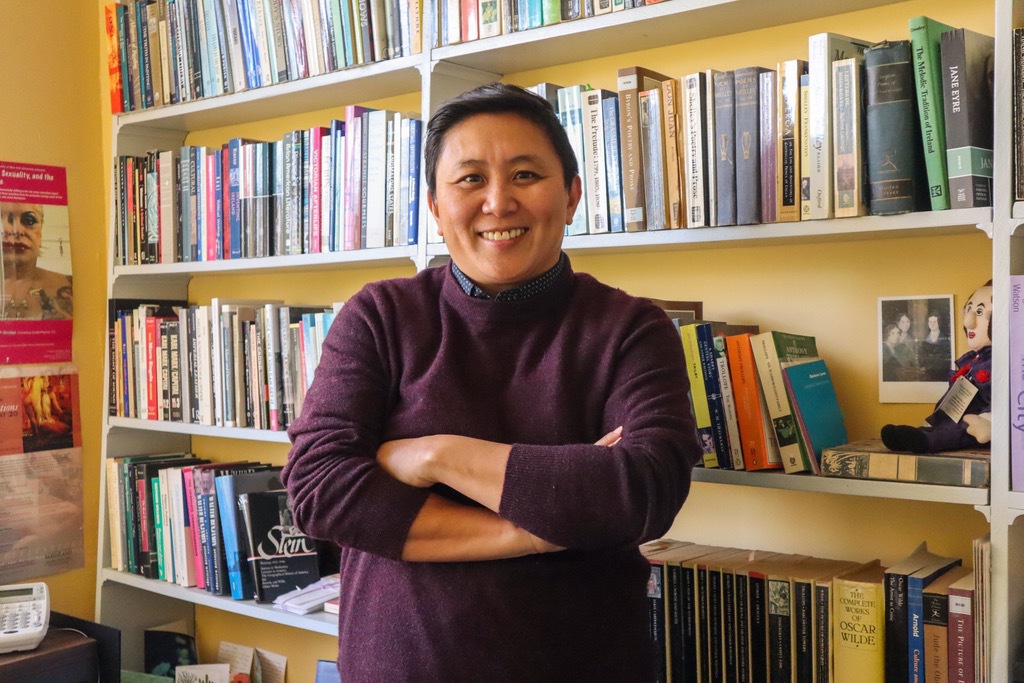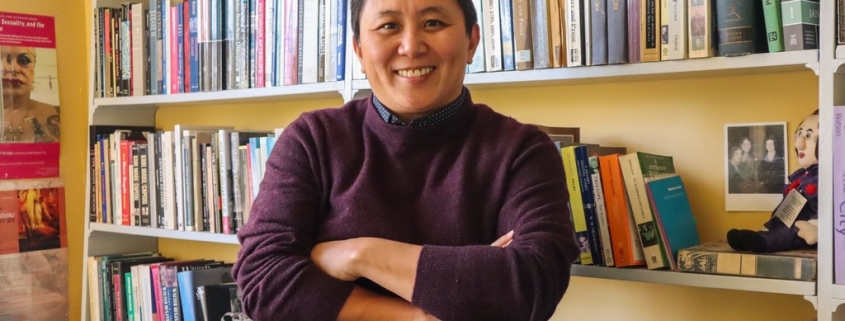Breaking barriers

When she first entered college, professor Karen Tongson wanted to teach high school. A few years later, she decided teaching at the community college level was for her. Fast forward another few years and Tongson, then a graduate student, began imagining herself as a faculty member at a research university.
Now, after 15 years as an associate professor at USC, Tongson is the first woman of color to be promoted to the rank of full professor in the English Department of the Dornsife College of Letters, Arts and Sciences.
Tongson, who teaches English, gender and sexuality studies and American studies and ethnicity, said that she hopes to use this promotion as a way to encourage ambition within her own students. Getting the position means having a chance to mentor students make sure other professors with similar goals have someone to reach out to for advice about the process.
“The main thing that I said on social media and that I’ve said elsewhere is that I may be the first but I certainly won’t be the last,” Tongson said. “And so among the things that I’ve certainly devoted myself to is mentoring other scholars of color, other women scholars of color in my different departments, making sure that they know the process, that it isn’t mystified to them and that they know how to get to this point.”
Currently minority groups make up 19% of tenured professors in the arts and humanities at USC. This is more than three percent less in comparison to the University as a whole, which has 23% minority groups in tenure. 30% minority groups are currently on track in the arts and humanities to gain tenure, according to USC institutional research data from 2016.
“It was very shocking for me to hear that would be the case if my promotion went through, given that the school has been around since 1880,” Tongson said. “But also because I myself was mentored by so many tremendous female professors of color in this department.”
Receiving a promotion to full professor in the English Department includes requirements of publishing peer-reviewed papers and two single-authored books, serving on department committees and continuing to teach as well.
Tongson has taught a variety of classes at USC, including “Seminar in Gay, Lesbian, Bisexual and Transgender Studies,” “Introduction to American Popular Culture” and a Maymester course “Gender, Sexuality and Food Cultures in the U.S.”
“I’ve taught such a range of different courses for undergraduates and graduate students,” Tongson said. “I love teaching my graduate seminars — I especially like teaching graduate seminars where there is not only a kind of critical intellectual component, it’s usually on LGBT studies, but [also] one that has a creative writing component.”
Tongson came to USC in Fall 2005 to begin her first tenure-track academic job after completing fellowships at UC San Diego and UC Irvine and graduating from UC Berkeley in 2003 with a doctorate in English. Reflecting on her past 15 years teaching here, Tongson said that her time here has passed very quickly and been full of surprises. She said being a female professor of color has meant having to serve as a role model for minority students and mentoring them as an educator.
“We give so much of ourselves for our students … sometimes that also means that we kind of put some of our own work on the back burner,” Tongson said.
Kyunghee Eo, a graduate student studying English and gender studies, said Tongson serves as an inspiration to many students because of how she has dealt with challenges as a queer woman of color in academia. Eo said that as more female students, queer students and students of color join the department, they benefit from working with faculty like Tongson who can relate with them and serve as a mentor.
“We just assumed it’s a hard road being a woman of color in academia, but really after we learned she got full professorship — that she was, in fact, the first — it came as a bit of a shock to us,” Eo said. “It’s just kind of a reflection of how difficult things can be for minorities to survive in academia.”
Eliot Dunn, a graduate student studying English, first met Tongson as a prospective student in the program. In the four years he has known her, he has taken her classes and worked with her on his writings and dissertation, which she is directing.
“I think what excites me about working with her is that she’s so open and excited about new ideas,” Dunn said. “It can be difficult and a little bit scary as a Ph.D. student to, especially in the beginning, bring your ideas to someone who’s such a senior faculty.”
Dunn also said that while he isn’t surprised that institutions have been slow at promoting minorities in academia, he was surprised to hear Tongson would be the first woman of color in the English Department to become a full professor.
“She probably shouldn’t have had to hustle quite so hard to get where she is,” Dunn said. “I’m sure that part of that is because she’s facing these institutional barriers. [It’s] really inspiring to see someone with that kind of drive and excitement for their profession, so I think she’s a really great role model for us.”
David Roman, a professor of English and American studies and ethnicity, has mentored Tongson and seen the work she has published in diverse fields including gender studies, literary studies, popular culture, critical race studies and queer theory prior to getting her position. He said he helped her navigate through the resistance she faced as a faculty member of color.
“As a senior person of color in the department and as the first out queer professor of color in the department, the most important thing that I’ve been tracking with Karen is maintaining the quality of the work and helping her succeed professionally,” Roman said.
Roman also said with the under-representation of Filipino scholars, Tongson serves as an example for both the community and for other faculty members to follow.
“Her position will be enormously inspiring to younger faculty members, who can see a role model now,” Roman said. “That’s always the thrill of seeing someone you know break a glass ceiling is that they become enormously inspirational figures.”

